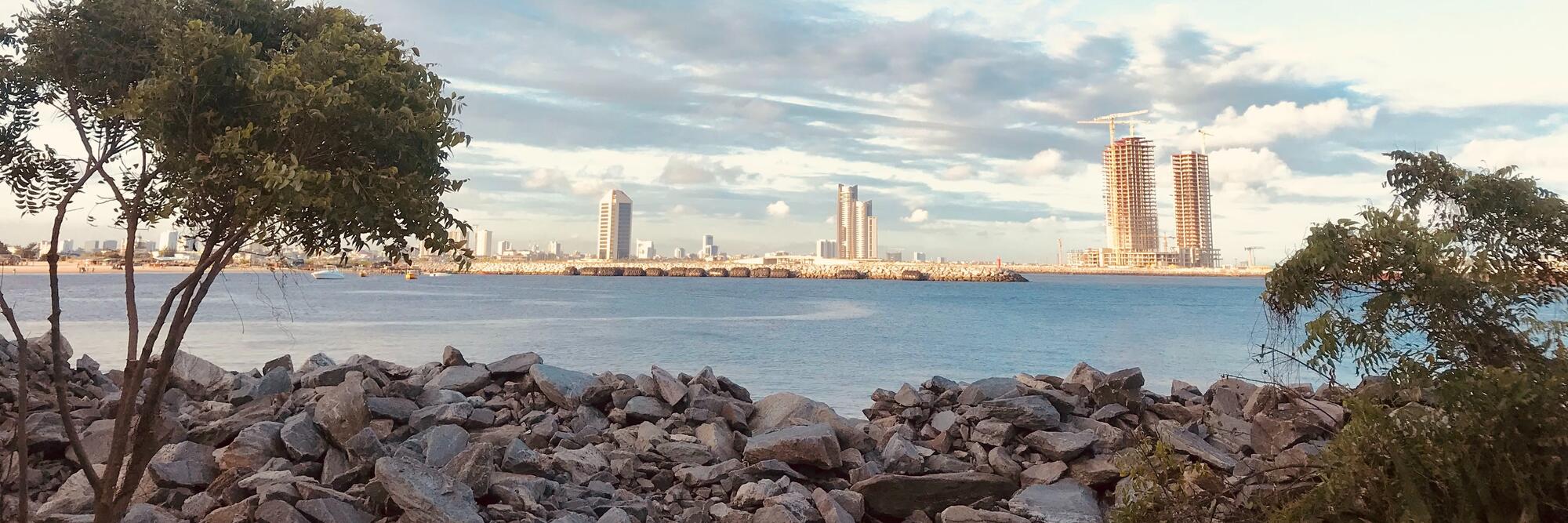Ann is a British expat living in Abuja. She initially moved to Nigeria with her husband, who subsequently returned to the UK. Ann loves every aspect of her life in Nigeria and has no intention of returning to her country of birth. Read about her fascinating adventures in this West African country.
Learn more about Nigeria in the Expat Arrivals Nigeria guide or read more expat experiences in Nigeria.
About Ann
 Q: Where are you originally from?
Q: Where are you originally from?
A: Grimsby, England, UK
Q: Where are you living now?
A: Abuja, Nigeria
Q: When did you move to Nigeria?
A: Left the UK in 2011, arriving in Nigeria in February 2012. Relocated to Abuja in August 2013.
Q: Did you move to Nigeria alone or with a spouse/family?
A: Initially, I moved here with my spouse, but he returned to the UK, so I elected to stay alone here.
Q: Why did you move to Nigeria; what do you do?
A: Always wanted to travel Africa and eventually live and work here. I work as a Room Division Manager in a large hotel.
Living in Abuja
Q: What do you enjoy most about Abuja? How would you rate the quality of life compared to the UK?
A: I lived here in the village for six months before moving to Enugu, where I lived until recently when I moved to Abuja. Life is different depending on where you live, and I tend to live as a Nigerian rather than an expat. Even so, the quality of life is good; it is just different. It can be as simple or Western as you like. That is the beauty of Nigeria: You can live however you want, as simple or ostentatious as you like. Quality of life is different to the UK, but I wouldn’t say worse… Just different.
Q: Any negatives? What do you miss most about home?
A: I can honestly say I don’t miss a thing about the UK... I love the people, the culture and the lifestyle here... Not to mention the climate! So, for me, there are no negatives whatsoever... This is my home, and I will die here.
Q: What are the biggest adjustments you had to make when settling into expat life in Nigeria? Did you experience any particular elements of culture shock?
A: I didn’t have many problems adjusting as I spent three months travelling overland to get here, so I adjusted to many things. Getting to grips with the language was my biggest challenge in the village, and learning to communicate, even though most speak English, they are used to London English accents. I come from the north, but I have learnt a lot about how to communicate and my preconceptions... It has improved my communication skills. Be prepared for them wanting to be with you 24/7; they are gregarious and love to be together, don’t understand ‘closed doors’, and in their view, people only want ‘privacy’ when they are ill. So a closed door will invite more attention! We have a fear of offending people, but they are very direct, and you should be too. They won’t be offended.
Q: What’s the cost of living in Nigeria compared to home? What is cheap or expensive in particular?
A: Much cheaper compared to home, but then again, the salary is not as high either. Western food is expensive, but local food is very good and cheap. I have yet to find a hairdresser in Abuja for my “Oyibo” (white person) locks, but most things here are affordable.
Q: How would you rate the public transport in Abuja? What are the different options? Do you need to own a car?
A: Public transport is not as connected as, say, in London. Once you know how it works, you will be fine...whilst I drive, I also use public transport a lot and have a lot of fun on it. I love the Keke and regularly use the Motos (buses). A car gives you more independence, and I drive myself here, which is a lot of fun. I was excited to hear that the incumbent in the president’s office has started a railway system.
Q: How would you rate the healthcare in Abuja? Have you had any particularly good/bad experiences with regard to doctors and hospitals? Are there any hospitals you would recommend?
A: It’s all private and paid for. I found good healthcare in Enugu, non-existent really in the villages, and Abuja has good healthcare too. The hospitals are not up to Western standards and may lack equipment...I remember being sent to three different hospitals looking for a nebuliser without success. The doctors/nurses are very good, they just lack the equipment available in the West.
Q: What are the biggest safety issues facing expats living in Abuja? Are there any areas expats should avoid?
A: To be honest I have been okay... Just be aware that you stick out as a foreigner; the only place I felt vulnerable was Lagos. Abuja is safe and so was Enugu and I wander at large in both and regularly walk places and drive myself. I wouldn’t recommend the highways after dark but there is plenty of police, army and Nigerian Mobile Police (MOPOL) on the roads who do a good job... Just be friendly when they stop you after all. I recall being stopped just before I set off to Enugu one night and the MOPOL man collected my number and phoned me to check I had reached Enugu safely... I was most impressed. There are lots of examples of these kinds of experiences. People are very caring and, except for a few, want you to be safe and happy in their country.
Q: How do you rate the standard of housing in Abuja? What different options are available for expats?
A: Expats can get good quality housing at reasonable prices, it depends on what their expectations are.
Q: Any areas/suburbs in Abuja you’d recommend for expats to live in?
A: Depends on whether you want to be in an expat ‘enclave’ or not. I prefer to integrate myself so I tend to shy away from living in groups of expats for that full on Naija experience.
Meeting people and making friends in Nigeria
Q: How tolerant are the locals of foreigners? Is there any obvious discrimination against particular religions or women etc.?
A: Very tolerant. They love to see you here. No discriminations for me but I think it depends on how you react to them. Learn a few basic phrases, relax and have fun with them and you will really enjoy the culture.
Q: Was it easy meeting people and making friends? How did you go about meeting new people?
A: Oh I meet and make new friends every day. I just get on with my life and you always talk to someone. Nigerians are very gregarious and interested in foreigners and their experiences so you will travel on a bus and find some new friends easily. They collect numbers and will keep in touch with you.
Q: Have you made friends with locals or do you mix mainly with other expats? What advice would you give to new expats looking to make friends? Any social/expat groups you can recommend?
A: Most of my friends are locals. My advice would be just get out there and start chatting; you will be amazed at how many people you will meet. Join a club and you will find people with similar interests. I avoid sticking with expats as I wanted to immerse myself in the culture; my whole point of coming here was to learn a new culture and experience it.
Working in Abuja
Q: Did you have a problem getting a visa or work permit for Nigeria? Did you tackle the visa process yourself or did you enlist the services of an immigration consultant?
A: I have a CERPAC which was not difficult to get. I wandered into Immigration and befriended a friendly immigration officer who guided me through the process... It was straightforward. I have been invited to his wedding at the end of November!
Q: What’s the economic climate like in Abuja? Do you have any tips for expats looking to find a job there? Which resources did you find most useful?
A: Know your value but be prepared to drop your expectations on salary... This is not the West and they can’t afford to pay us what we are worth unless it’s an international organisation. Take what you need to live well here and you will enjoy Naija well. Know that they work differently here though it’s about connections and introductions so networking is essential. Church affiliations are also important.
Q: How does the work culture differ from home? Do you have any tips for expats doing business in Abuja?
A: Very different to the culture back home but in some ways so much better. The mixture of cultures makes Nigeria unique to Africa, I have found. They observe both Muslim and Christian festivals and calendars. Friday is Muslim holy day and the Christians use it to travel out of the cities to the villages. Family is central to everything here.
Doing business is by networking so you network when you are doing business. Phones are always going off... The line between business and pleasure is blurred. You become friends and do business together... The two are connected. Business meetings take longer as you have to find out about peoples’ families and life before business is conducted, then business then more socialising.
Family and children
Q: Did your spouse or partner have problems adjusting to their new home? Do you think there are any specific challenges for a trailing spouse?
A: My spouse is half-Nigerian and he couldn’t adjust and went back to the UK.
Q: What are the schools like, any particular suggestions?
A: Schools are better in some ways with discipline and the children are driven more. Behaviour is much better.
And finally…
Q: Is there any other advice you would like to offer new expat arrivals?
A: Come with an open mind and see it as an adventure, if you are bringing children worry less about them as they will adjust quicker than you. Don’t expect too much and just enjoy it as it unfolds. Don’t try to make it the same as where you originated from, it won’t work. Try not to compare too much and do try to look at it through African eyes it will make so much more sense. Please do not assume that people are unhappy because they are materially poor...they have much more spiritual wealth and are happy as a result! Learn to haggle and enjoy it! Enjoy the experience and do mix with the locals at the markets and join in the banter, you can make someone’s day just by having fun with them... You will get so much more enjoyment out of the people and the experience!
– Interviewed October 2013



